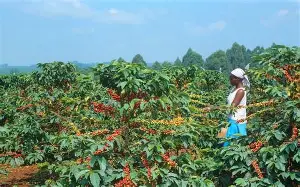ITURI HIGHLANDS (ITURI PROVINCE)
The Ituri Highlands, located in the north-eastern part of the Democratic Republic of the Congo, form one of the country’s most promising Arabica coffee zones. Bordering Uganda and lying just north of the Albertine Rift, the region’s high elevation, fertile volcanic soils, and favourable rainfall patterns make it ideal for cultivating high-quality specialty coffees.
The Ituri Highlands are located in the north-eastern part of the Democratic Republic of the Congo, bordering Uganda and lying adjacent to Lake Albert. The region sits at altitudes typically ranging between 1,500 and 1,900 meters above sea level, providing ideal conditions for high-quality Arabica cultivation. It experiences a cool equatorial highland climate with consistent rainfall and moderate temperatures averaging 16–22 °C throughout the year. The volcanic and alluvial loam soils, rich in organic matter, contribute to the exceptional fertility of the area. Its rolling highlands and forested slopes offer natural shade and good drainage, both essential for producing premium coffee.
Coffee production in the Ituri Highlands is concentrated in Aru, Irumu, Mambasa, and Djugu territories. Farming is dominated by smallholders, with most plots ranging from 0.5 to 2 hectares. In recent years, new cooperatives and farmer associations have emerged, supported by development partners and regional exporters seeking to strengthen local value chains. The region’s processing infrastructure has also improved significantly since 2020, with the establishment of new wet mills and washing stations that enhance consistency and overall cup quality.
The Ituri Highlands produce 100% Arabica coffee, primarily of the Bourbon, Typica, and Caturra varieties. Processing is predominantly washed, although small-scale trials with natural and honey processing methods are becoming more common. Coffees from this region are known for their sweet, clean flavours, bright acidity, and balanced fruit notes such as berry, citrus, and red apple, complemented by floral and cocoa undertones and a medium body.
Coffee plays an increasingly important role in the livelihoods of smallholder farmers throughout the Ituri Highlands. After years of underinvestment, NGO-led programs and cross-border trade initiatives are helping to revitalize the sector. Projects such as the Virunga Coffee Alliance and collaborations with Ugandan exporters have strengthened quality control, traceability, and market access. As a result, Ituri coffee is gaining international recognition in the specialty market, celebrated for its clean cup profile and sustainable smallholder production system.





